Personal injury firms run on volume and velocity. Between new calls, referral leads, medical records, treatment updates, liens, deadlines, and settlement negotiations, your team is constantly juggling moving parts—and every missed follow-up or delayed response can mean a lost case.
Many firms still manage leads and client communication across spreadsheets, inboxes, and disconnected tools. That makes it hard to see where each prospect stands, track the next step, and connect intake activity to outcomes. Over time, these gaps manifest as missed opportunities, slower intake conversion, frustrated clients, and limited visibility into which marketing and referral sources actually drive revenue.
That’s where a personal injury CRM comes in. The best CRM for personal injury law firms centralizes intake, follow-ups, case communication, and reporting in one place—so you can respond faster, stay organized as cases get complex, and build a client experience that inspires trust from day one.
Below, we’ll break down the best CRM solutions for personal injury law firms, what features matter most, and how the right platform can give your firm a real competitive edge.
Best CRM solutions for personal injury law firms
Not every legal CRM is built for the needs of a personal injury practice—high lead volume, fast response expectations, strict deadlines, and financial complexity that doesn’t fit neatly into generic sales pipelines.
Below is a curated comparison of the top CRM solutions used by personal injury law firms, evaluated specifically through a personal injury lens: intake and follow-up workflows, referral tracking, client communication, reporting, and financial visibility. Use this list to quickly narrow down the best option for your firm—whether you need a personal injury-specific all-in-one platform or a standalone CRM that integrates with your existing tech stack—and identify which tools are best for personal injury law firms based on your workflow and growth goals.
Tool | Category | Best for | Strengths | Weaknesses |
8am CasePeer | Personal injury-focused practice management with integrated CRM | Personal injury firms that want all-in-one intake, case, and financials | Built specifically for personal injury workflows, strong dashboards and reporting, integrated financial controls, referral tracking, and medical treatment tracking | May not be ideal for firms with multiple practice areas outside personal injury |
8am MyCase | Practice management with integrated CRM | Most law firms that want easy adoption and core features | User-friendly; client portal and messaging; billing and basic CRM in one platform | Less personal injury-specific workflow and financial depth for high-volume personal injury firms |
Lawmatics | Legal CRM (not full practice management) | Firms focused on intake automation and marketing workflows | Strong intake forms and automation; email/SMS marketing; integrates with MyCase | Setup/learning curve: lacks case management without a separate platform |
HubSpot | Generic CRM | Firms that want a flexible, non-legal CRM (often with marketing teams) | Powerful CRM foundation; strong integrations; free tier available | Not built for legal workflows; lacks case management, legal-specific reporting and intake require heavy customization |
Lead Docket | Legal lead management software | Firms that want lead intake and pipeline tracking (often paired with Filevine) | Strong lead intake organization; customizable workflows; integrates with some case management platforms | Reporting depth can be limited; not full practice management; sync/integration issues reported by some users |
Clio Grow | Intake/CRM; integrates with Clio Manage | Firms already in the Clio ecosystem | Legal intake workflows; automation for follow-ups; strong Clio ecosystem | Limited marketing/referral ROI tracking; personal injury functionality may require add-ons |
Law Ruler | Legal CRM and intake management | Firms that want legal intake tracking and lead pipelines | Built for law firm lead management, robust features support scaling | Can feel dated vs. newer platforms; setup complexity; slower innovation cycle |
Filevine | Practice management (often paired with a lead tool) | Firms that want customizable case/project management | Strong customization, collaboration, and organization; supports complex case workflows | Can become complex to maintain; performance/stability complaints; may require add-ons for full CRM/intake depth |
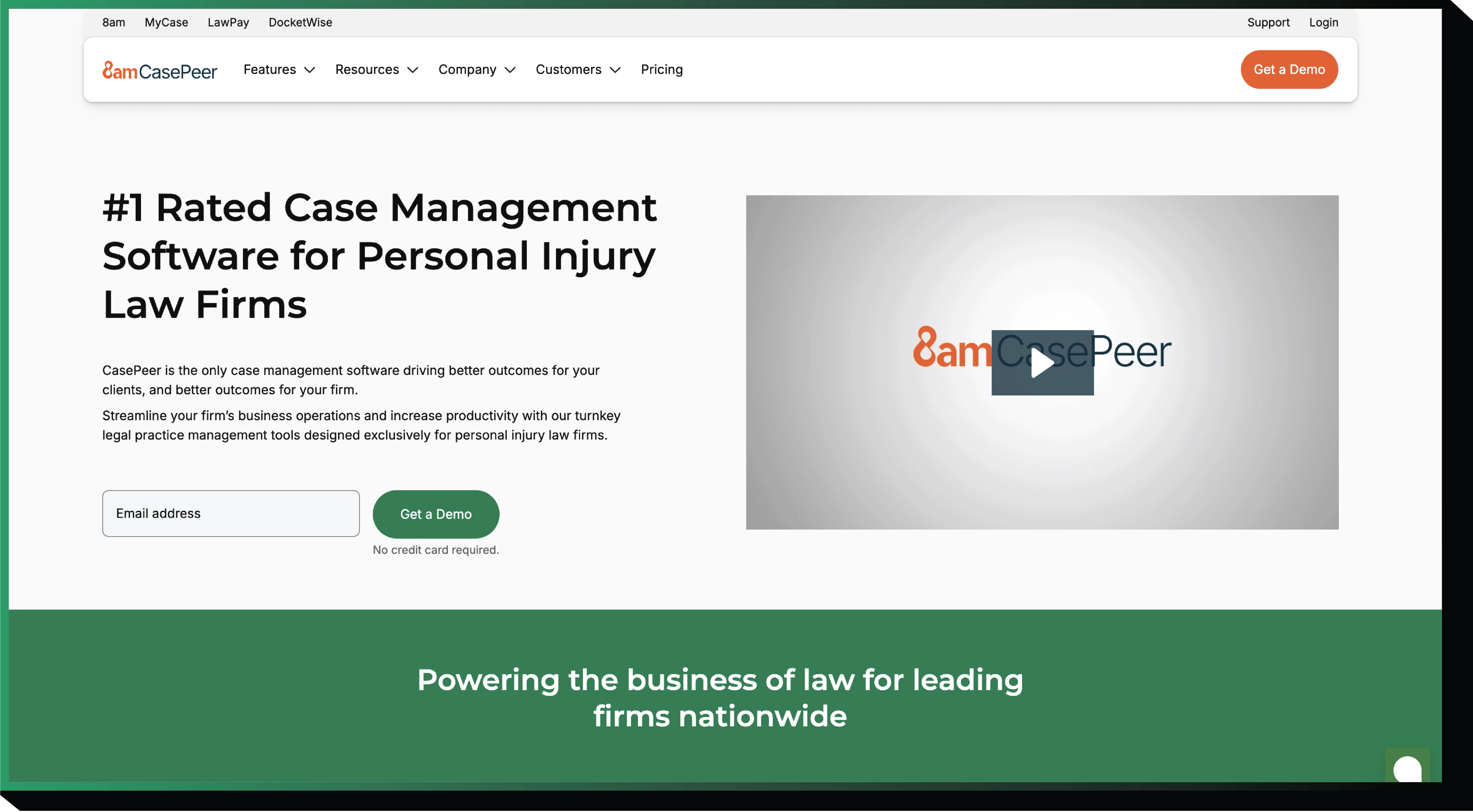
1. 8am CasePeer
CasePeer is a complete legal practice management platform built specifically for personal injury firms, with an integrated personal injury CRM at its core. Instead of stitching together intake tools, spreadsheets, email threads, and financial reporting add-ons, CasePeer provides personal injury firms with a single system to manage the full client lifecycle—from initial contact to settlement—while maintaining clear visibility into performance and profitability.
Purpose-built personal injury workflows and dashboards designed around real personal injury case stages, tasks, and deadlines
All-in-one CRM and case management that keeps intake, communication, case progress, and key documents centralized
Integrated financial controls and reporting to track settlements, expenses, and firm performance without relying on external tools
Referral tracking and marketing ROI visibility that connects lead sources to outcomes, helping you double down on what drives real revenue
Best for: Personal injury firms wanting an all-in-one system that provides in-depth personal injury reporting, financial transparency, and referral tracking.
Potential drawback: Because it’s built specifically for personal injury law, it may not be the best fit for firms handling multiple practice areas outside of personal injury.
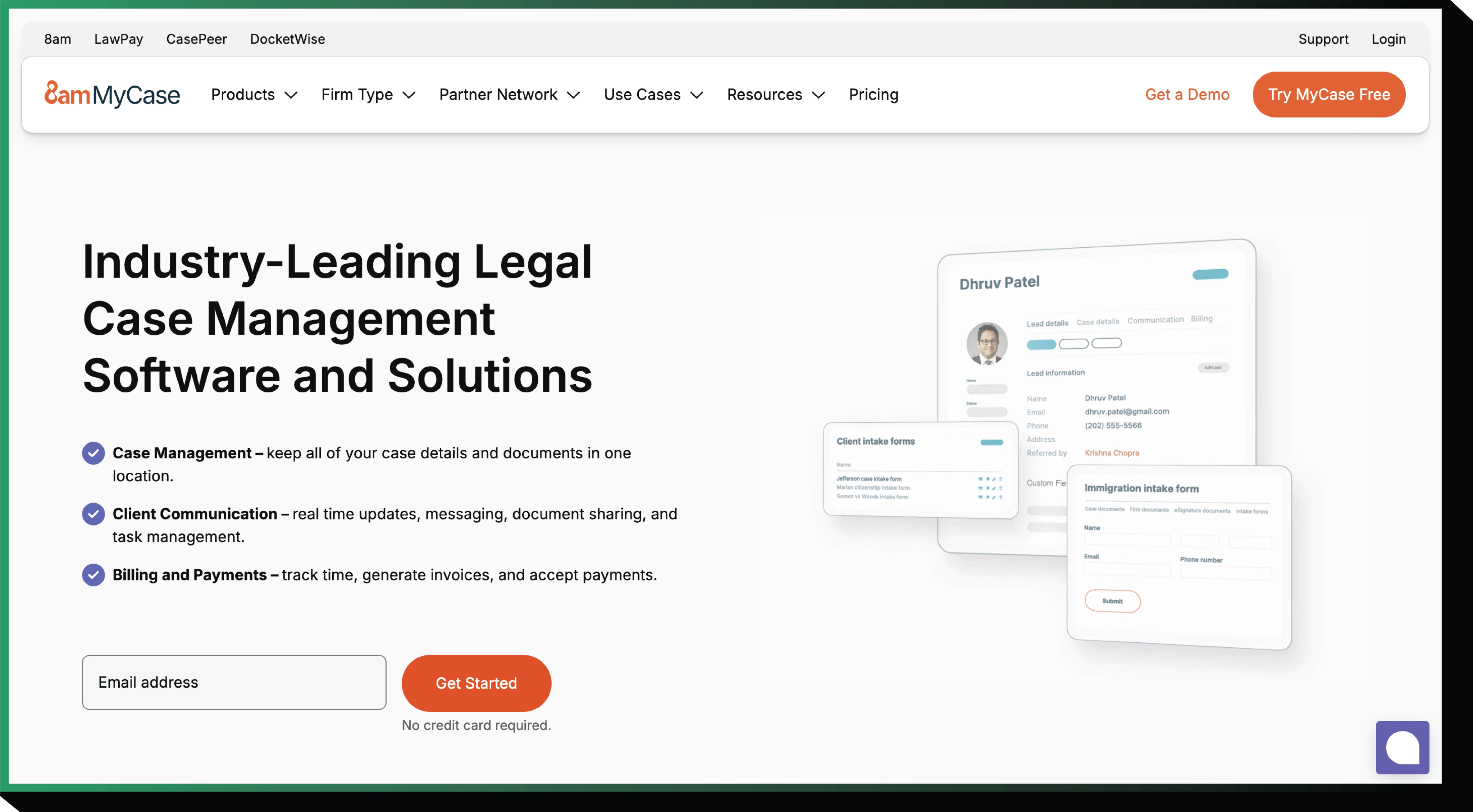
2. 8am MyCase
8am MyCase is a complete legal practice management platform with an integrated CRM that’s known for being easy to adopt and simple to use. For smaller personal injury firms that want a reliable foundation for client management, communication, and billing without a steep learning curve, MyCase can be a strong entry point—especially if your workflows are straightforward.
User-friendly interface that supports quick adoption with minimal training
All-in-one practice management and CRM, including contacts, matters, billing, and task management
Built-in client portal and secure messaging to centralize communication and keep clients informed
Accessible entry-level pricing that works well for solos and small personal injury firms with simpler intake needs
Best for: Most law firms, including those that handle personal injury cases, that want a straightforward legal CRM and practice management solution.
Potential drawback: While easy to use, it may not offer the personal injury-specific financial and workflow depth that higher-volume firms need.
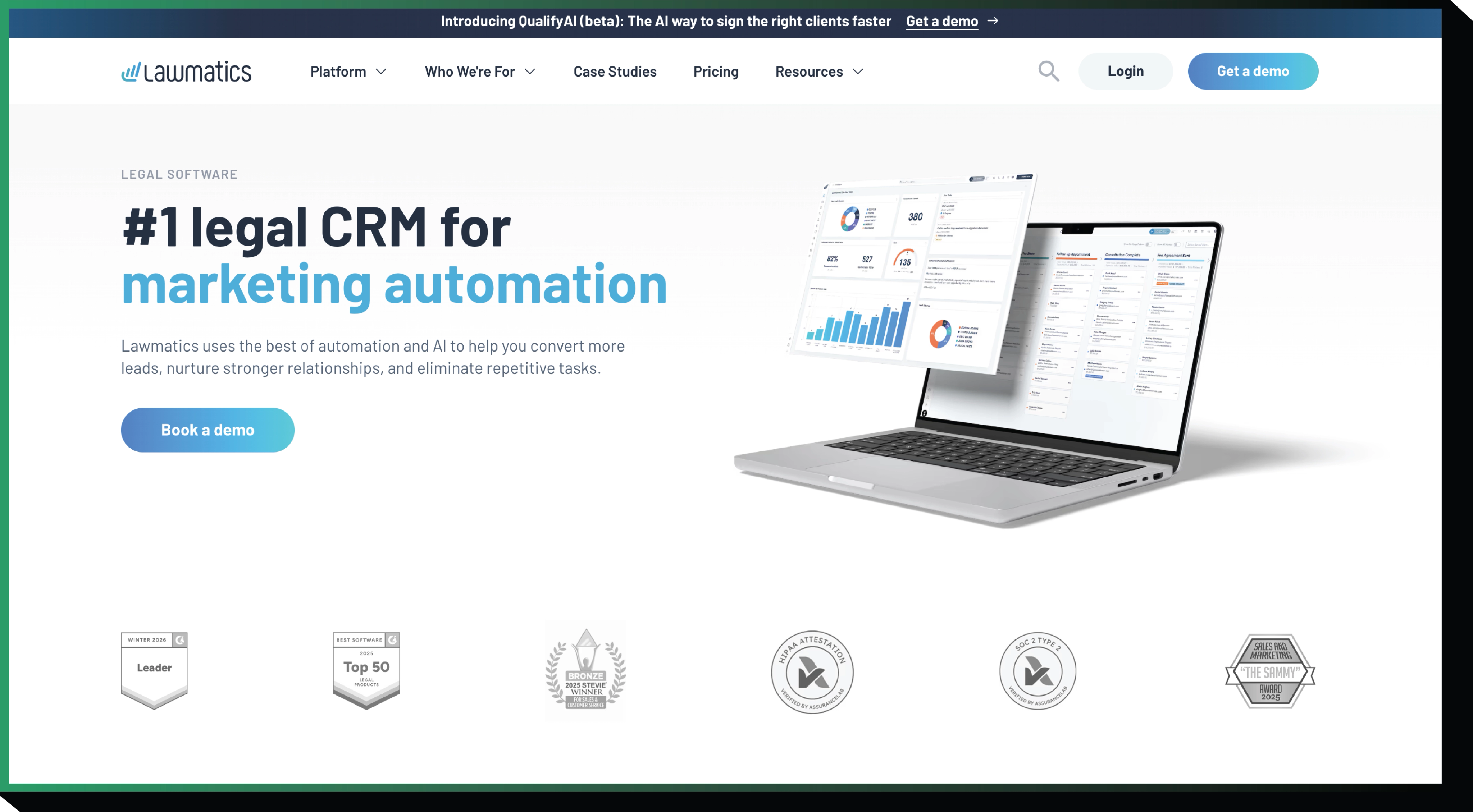
3. Lawmatics
Lawmatics is a legal CRM focused on intake automation, lead nurturing, and marketing workflows. It’s a strong option for firms that want to systematize how they capture and follow up with new leads—especially if they need automated email/SMS sequences, customizable intake forms, and built-in marketing features. Lawmatics also integrates with MyCase, which can be helpful if you want a best-of-breed intake engine paired with full practice management.
Powerful intake automation and form workflows that help firms customize onboarding and reduce manual work
Built-in email and SMS marketing tools to nurture leads and automate follow-ups at scale
Legal-focused CRM design that feels more tailored to law firm workflows than generic CRMs
Integration options with platforms like MyCase to connect intake to ongoing matter management
Best for: Firms that want to optimize intake and lead follow-up with automation and marketing tools. Potential drawbacks: Setup can be time-consuming, and Lawmatics is not a comprehensive practice management system, so you’ll still need case management and financial reporting elsewhere.
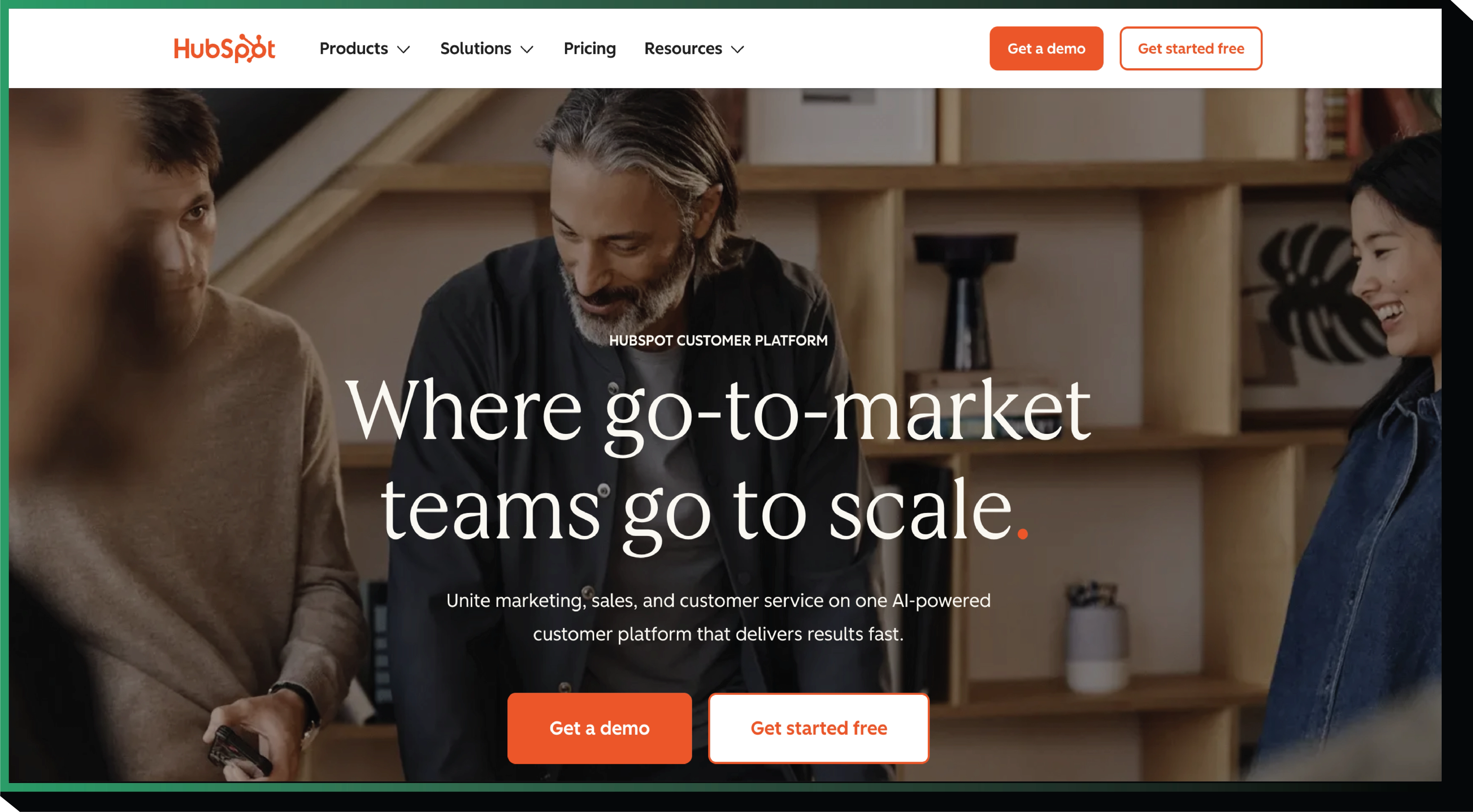
4. HubSpot
HubSpot is a widely used generic CRM known for its clean interface, robust feature set, and extensive integration ecosystem. Some personal injury firms use HubSpot when they have a strong marketing team and want to run sophisticated lead pipelines and campaigns—but it typically requires significant customization to function like a true legal CRM for personal injury, and it won’t replace practice management software.
Intuitive user experience that teams can adopt quickly
Comprehensive free tier for core CRM features like contact and deal tracking
Strong integration ecosystem that connects with email, calendars, and marketing tools
Flexible pipeline and reporting tools for managing leads and business development
Best for: Firms with dedicated marketing/sales operations that want a flexible CRM engine.
Potential drawbacks: HubSpot isn’t designed for legal workflows or comprehensive practice management. The free plan has limited functionality, and the cost of advanced features adds up quickly.

5. Lead Docket
Lead Docket is legal lead management software designed to help firms track and manage leads, intake workflows, and follow-ups. It’s commonly used as an intake layer paired with case management tools. It can be a good fit for teams that want strong lead organization and customization without needing a full all-in-one platform.
Strong intake and lead organization to track prospects and follow-ups efficiently
Customizable workflows and intake fields so firms can tailor the system to their intake process
Integrates with some case management platforms (including Filevine) to support continuity from lead to case
Designed around law firm intake needs rather than generic sales pipelines
Best for: Firms that want to pair intake and lead pipeline tools with another system. Potential drawbacks: Reporting depth can be limited, document/integration capabilities may be inconsistent, and it’s not a full practice management solution. Some firms also report challenges with syncing to Filevine.
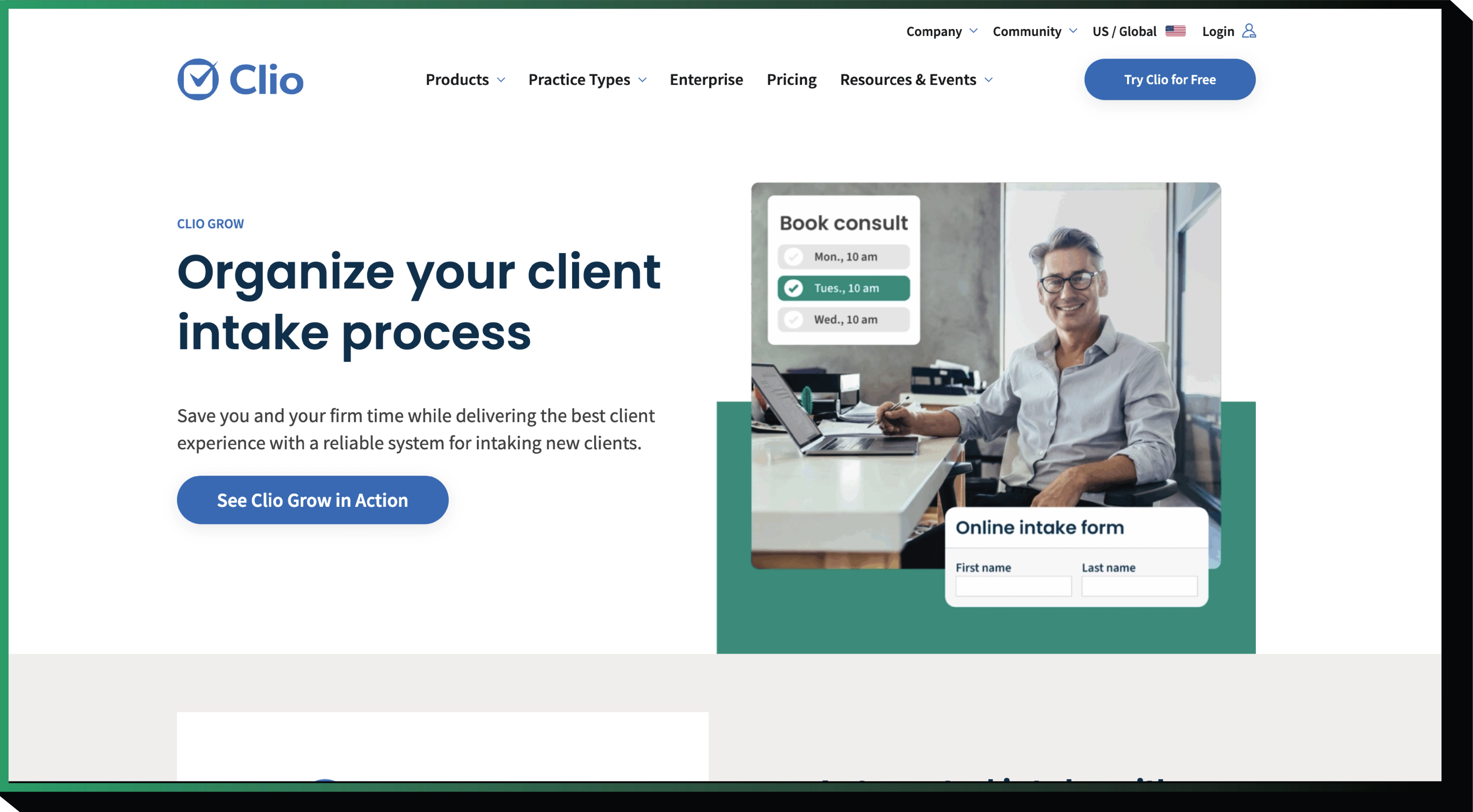
6. Clio Grow
Clio Grow is Clio’s client intake and CRM tool, available to be used exclusively with Clio Manage. It’s a recognizable option for firms already invested in the Clio ecosystem and looking for a legal-focused intake solution with scheduling, forms, and workflow automation. For personal injury firms, however, Clio’s Personal Injury add-on (+$30 per user per month) is required to more effectively match personal injury workflows.
Intake features built for law firms, including onboarding forms and scheduling
Automation and workflow tools that support follow-ups and pipeline management
Fits into the broader Clio ecosystem, which can be helpful for firms already using Clio Manage
Standard CRM foundation for tracking leads and converting prospects into clients
Best for: Multi-practice firms already using Clio that want an intake-focused CRM layer.
Potential drawbacks: Some users report that the platform’s ROI tracking for marketing and referrals is limited, and the personal injury add-on may not offer the same level of specialization as purpose-built PI platforms. Also, some of the email tracking features (including BCC tracking) require more manual setup compared to systems that offer centralized features for automated communication.
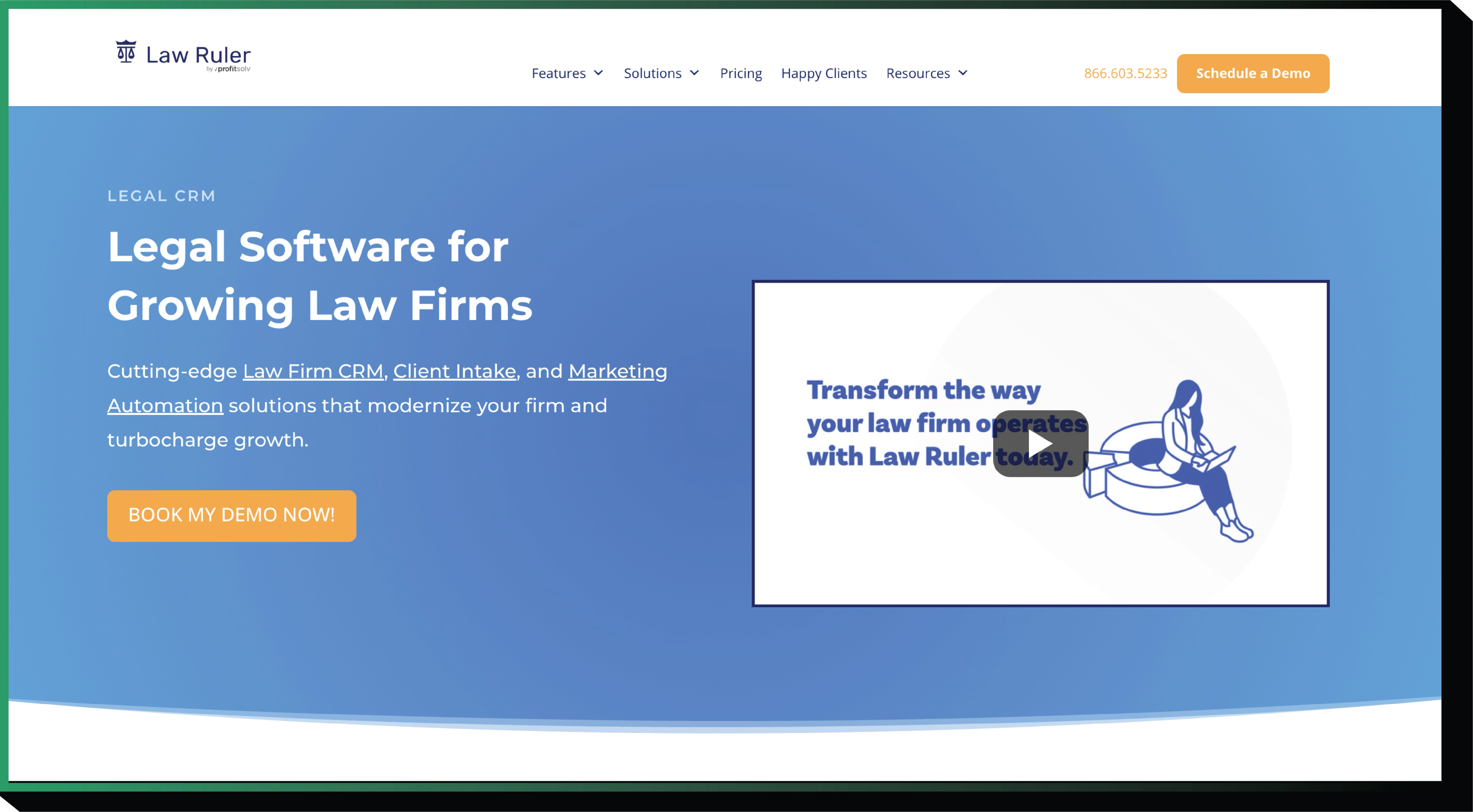
7. Law Ruler
Law Ruler is a legal-focused CRM that centers on intake tracking and lead pipelines. It’s often positioned for firms that need more robust intake and lead management than basic legal CRMs but aren’t necessarily looking for a broader, modern all-in-one platform. It can work well for firms that want structured pipelines and intake workflows—though some teams find it less modern than newer solutions.
Legal CRM with intake tracking designed for managing leads and client onboarding
Robust feature set compared to basic CRMs, with more law-focused functionality
Scales with firm growth, supporting more complex pipelines and follow-up processes
Structured intake and tracking tools that help teams manage lead volume and handoffs
Best for: Firms that want legal intake tracking and lead pipeline depth and don’t need a modern practice management solution.
Potential drawbacks: Product updates can feel slower than newer platforms, the interface may feel dated, and complexity can be a hurdle for teams without dedicated onboarding support.
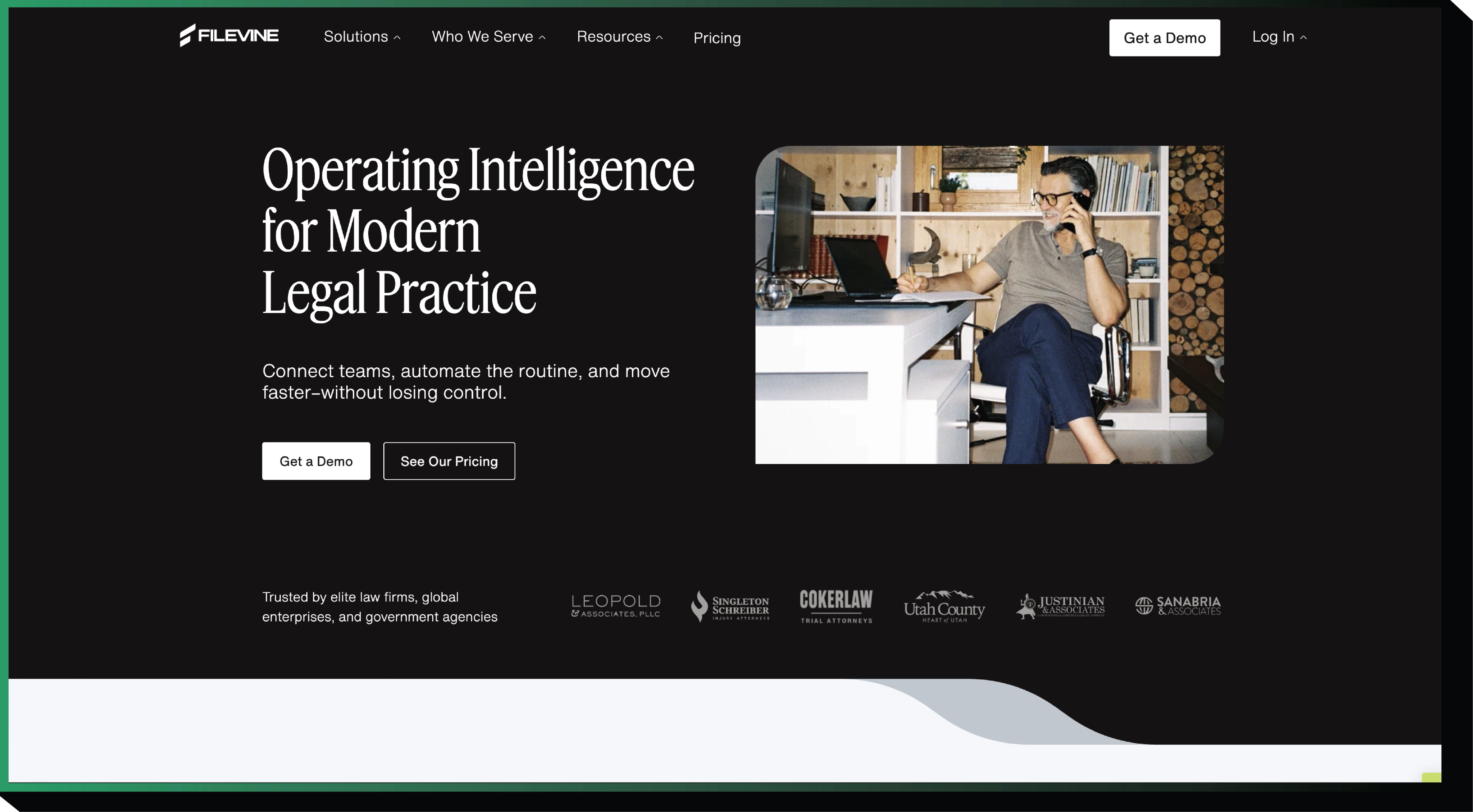
8. Filevine
Filevine is a practice management platform known for customizable workflows and case organization, and it’s often used by personal injury firms that want deep configurability. Many teams rely on Filevine as their central case system, then add a separate lead intake tool (like Lead Docket) to handle CRM-style intake and pipeline tracking. For some firms, Filevine’s flexibility is an advantage—though it can also create complexity.
Highly customizable workflow and case management, allowing firms to tailor the setup to their practice
Centralized organization and collaboration, bringing team communication and case info into one place
Strong configurability across projects and templates, helpful for firms with complex processes
Scales with larger teams and high case volume, especially when configured well
Best for: Larger firms with highly specific workflow and case requirements that are willing to invest time in a more complex setup. Potential drawbacks: Users report performance and stability issues at times, full functionality can require add-ons, and extensive customization can slow adoption if the system becomes overly complex. Many firms also pair it with a dedicated lead tool for full intake depth.
Why do personal injury lawyers need a CRM?
Personal injury lawyers need a CRM because personal injury work is high-volume, deadline-driven, and relationship-based—and it’s hard to manage consistently with spreadsheets, inboxes, and scattered notes. A personal injury CRM gives your firm a single system to track leads, communicate with clients, manage follow-ups, track medical treatments, and keep cases moving forward without losing visibility.
And because personal injury firms typically work on contingency, a CRM is also a risk-management tool: it helps you evaluate and prioritize the right cases, respond quickly to strong prospects, and track which intake sources actually lead to successful outcomes and settlements.
Here are the most significant reasons personal injury firms rely on CRM software:
Improved client communication and case visibility: Keep every call, message, email, and update in one place so anyone on your team can step in, answer questions, and move the case forward without missing context.
Streamlined intake and lead nurturing: Capture leads from calls, web forms, referrals, and ads—and ensure every prospect gets a fast, consistent follow-up so you don’t lose cases to competitors who respond first.
Centralized case organization and data tracking: Store contact details, incident information, medical treatment updates, documents, and key notes in a single record, ensuring that nothing gets lost across systems.
Increased efficiency through automation: Automate routine tasks like reminders, follow-up sequences, intake workflows, and internal handoffs, so your team spends less time chasing information and more time moving cases.
Higher client satisfaction and retention: When clients feel informed and supported—especially during long treatment timelines—they’re more likely to stay engaged, leave positive reviews, and refer friends and family.
In short, the best CRM for personal injury law firms doesn’t just help you stay organized—it helps you sign cases faster, run cases more predictably, and build trust at scale.
Essential CRM features for personal injury cases
Not all CRM software is equipped to handle the realities of personal injury law. Personal injury firms need tools that go beyond basic contact management to support high lead volume, strict timelines, ongoing client communication, medical treatment progression, and financial visibility tied to settlements and case outcomes.
The best CRM solutions for personal injury law firms include features built specifically for these demands—helping firms manage intake efficiently, track treatment and settlement milestones, keep cases on schedule, and deliver a better client experience without adding administrative overhead. Below are the core CRM features that matter most for personal injury cases and day-to-day PI workflows.
Client intake
For personal injury firms, client intake sets the foundation for the success of a case. Leads move quickly—often originating from a law firm website—and expectations are high. According to the Legal Benchmark Report: Part 2, personal injury firms had the shortest average time from lead intake to conversion in 2023, at just three days, yet they also recorded the lowest consultation attendance rate across practice areas, at only 7%. This gap highlights how critical it is not just to move fast, but to manage intake thoughtfully and consistently across every entry point.
In personal injury-focused platforms, intake forms feed directly into case records, eliminating manual data entry and reducing errors. Your team can collect incident details, injury information, insurance data, and initial assessments once, then use that information throughout the life of the case. Faster intake, clearer handoffs, and consistent follow-up help firms respond quickly and sign stronger cases before competitors do.
Lead management
High lead volume is common in personal injury law, but without the right system, it’s easy to lose track of prospects or delay follow-ups. A personal injury CRM software solution centralizes all leads in one place and clearly indicates the status of each prospect—from initial contact to signed client.
The best CRM solutions for personal injury law firms track leads, referrals, and marketing ROI directly within the platform, so you can see which sources produce the highest-quality cases. This enables firms to prioritize the right opportunities, increase conversion rates, and allocate marketing spend to channels that deliver tangible results.
Automated case workflows
Personal injury cases involve repeatable steps—medical treatment updates, status check-ins, document requests, and deadline reminders. Automated case workflows allow firms to standardize these processes while reducing manual work.
With automation in place, CRMs can trigger reminders, follow-up messages, task assignments, and internal alerts based on case milestones. This keeps cases moving forward consistently, ensures that nothing falls through the cracks, and frees up attorneys and staff to focus on higher-value work, such as case strategy and client advocacy.
Referral tracking
Referrals are a significant growth driver for personal injury firms, but many teams struggle to measure which relationships actually lead to successful cases. A personal injury-specific CRM addresses this by directly tying referral data to case outcomes.
Referral tracking connects client sources to settlement outcomes, giving firms measurable insight into which referral partners and campaigns generate the most value. With this data, firms can strengthen high-performing relationships, enhance referral follow-up, and make more informed decisions about where to allocate time and resources.
Reporting and analytics
Without clear reporting, it’s difficult to understand how your firm is performing or where improvement is needed. A legal CRM for personal injury provides built-in reporting and analytics that go beyond basic activity tracking.
Firms can monitor intake performance, case progress, settlement values, referral ROI, and overall firm health through dashboards and reports. These insights support data-driven decisions, help teams identify bottlenecks, and give firm leaders the visibility they need to scale with confidence.
Integrations
A CRM should enhance your existing tech stack, not create more silos. The best CRM for personal injury law firms integrates with the tools your team already relies on—such as document management systems, accounting software, email, and marketing platforms.
These integrations reduce duplicate data entry, maintain consistent records across systems, and ensure that information flows smoothly from intake to settlement. The result is a more connected operation and fewer gaps that slow teams down.
Client portal
Personal injury cases often last months or longer, making consistent communication critical to client trust. A client portal provides clients with a secure, centralized platform to view updates, share documents, send messages, and stay informed, eliminating the need for constant phone calls.
By offering easy access to case information and communication, firms improve transparency and responsiveness—two key factors in client satisfaction. When clients feel informed and supported, they’re more likely to stay engaged, leave positive reviews, and refer others to your firm.
How to choose the best crm for your personal injury law firm
The best CRM for personal injury law firms is the one that fits your intake process, keeps cases moving, and gives you clear visibility into performance—without creating extra work.
Here’s what to consider when comparing personal injury CRM software:
Firm size and team structure (solo vs. multi-attorney and intake staff)
Lead and case volume (can it handle high intake volume and follow-ups?)
Intake complexity (calls, forms, referrals, ads—can it capture everything cleanly?)
Financial visibility needs (settlements, expenses, ROI by source)
Growth goals (referrals, marketing ROI, expansion, scalability)
Practical ways to evaluate CRMs:
Demo with real personal injury workflows (run through an actual intake and conversion scenario)
Involve the people who will use it daily (intake staff, paralegals, attorneys)
Prioritize native features over patchwork add-ons (especially for intake and reporting)
Check reporting early (lead sources, referral tracking, conversion, financial outcomes)
Choose ease of adoption over feature overload (the best tool is the one your team actually uses)
A strong legal CRM for personal injury should help you sign better cases faster, improve the client experience, and scale without losing control.
8am CasePeer helps personal injury firms improve client relationships
Personal injury firms don’t just need a place to store contacts—they need a system that can keep up with high lead volume, strict deadlines, and complex case workflows while still delivering a client experience that builds trust. The right personal injury CRM helps your team respond faster, stay organized, and track every touchpoint from intake through resolution—so strong cases don’t slip through the cracks and clients never feel ignored.
If you’re evaluating what the best personal injury law firm CRM for your practice is, CasePeer is built specifically for personal injury law, combining the core tools personal injury firms rely on into one platform—so you don’t have to manage intake in one system, communication in another, and financial reporting somewhere else.
With CasePeer, firms can:
Run personal injury-built workflows designed around real case stages, deadlines, and tasks, not generic pipelines
Centralize communication so every email, message, and case update stays tied to the right client and matter
Automate follow-ups and internal handoffs to keep intake consistent and cases moving forward
Track financial performance with integrated reporting, including settlements, expenses, and firm-level visibility
Measure referral and marketing ROI, connecting lead sources to outcomes so you know what drives profitable growth
If you’re comparing the best CRM solutions for personal injury law firms, CasePeer is designed to help you sign stronger cases faster, manage them more efficiently, and deliver the transparency and responsiveness that clients expect.
Ready to see CasePeer in action? Schedule a CasePeer demo or contact us to see how the platform supports the entire personal injury lifecycle—from intake to settlement—without relying on disconnected tools.
Personal injury CRM FAQs
About the author

Rob HeidrickSenior Content Strategist8am
Rob Heidrick is a Senior Content Strategist for 8am, a leading professional business solution. He covers the latest advancements in legal technology, financial wellness for law firms, and key industry trends.
